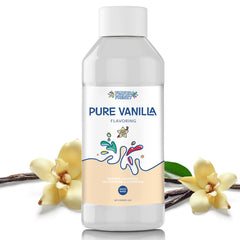Your Cart is Empty
Multifaceted Applications and Benefits of Linalool With Flavor Frenzy

Linalool is a naturally occurring monoterpene alcohol found in numerous plant species, playing essential roles in pollination and pest defense.
It boasts a soft, floral scent and is utilized in personal care products, food flavoring, and pest control, while also exhibiting significant health benefits such as anti-anxiety and anti-inflammatory effects.
Linalool is produced through biosynthesis, starting with the condensation of dimethylallyl diphosphate (DMAPP) and isopentenyl diphosphate (IPP) to form geranyl pyrophosphate (GPP).
Its applications extend beyond perfumery, with research highlighting its potential therapeutic uses, including the treatment of depression and irritable bowel syndrome.
Recent studies have shown that linalool can enhance ginsenoside production in hairy root cultures, offering a novel method for increasing the yields of these valuable compounds.
Looking at its broader uses, it's estimated that linalool is used in up to 80% of perfumed hygiene products and cleaning agents, underscoring its widespread application.
Want to purchase linalool – Get your custom quote today!
Discover also our products:
Natural Function of Linalool
Linalool, a monoterpene found in over 200 plant species, plays a multifaceted role in its natural function, particularly in promoting relaxation and reducing stress. It is involved in pollination biology, ensuring plant reproduction and survival by attracting pollinators with its floral aroma.
95% to 99% of natural linalool is extracted from essential oils, mainly from Brazilian rosewood and Chinese camphorwood.
Linalool also serves as a defense mechanism against insects and pathogens, contributing to the plant's overall health and protection. Its antimicrobial and anti-inflammatory properties help protect plants from infections and environmental stressors.
Recent studies have shown that linalool can reduce general inflammation and pain, and it is used in traditional medicine to relieve symptoms of anxiety and insomnia.
Furthermore, linalool's anxiolytic effects have been found to improve sleep quality, making it a valuable compound in the treatment of sleep disorders.
It is estimated that approximately 3000 chemical substances, including essential oils and their constituents, are commonly used in fragrance-containing products, highlighting the importance of linalool in various applications.
Historical Context and Discovery
The discovery and industrial production of linalool have a rich historical background, intertwined with the evolution of perfumery and the understanding of essential oils.
Initially produced in 1875 by isolation from Cayenne Bois de Rose oil, linalool was later sourced from various plants like linaloe and ho-leaf oils.
By 1955, the total industrial synthesis of linalool became cost-effective, replacing natural extraction and significantly increasing global supply.
Today, synthetic linalool dominates the market due to its lower cost and consistent quality. Over 12,000 tons of linalool were produced industrially in 2000, with synthetic methods accounting for over half of this volume.
The industrial production of linalool can be achieved through two main routes: partial synthesis from natural pinene and total chemical synthesis.
This versatility in production methods ensures a stable and reliable supply of linalool for various applications, including perfumery, cosmetics, and food flavoring.
The shift towards synthetic production has been driven by the growing global demand for aroma chemicals and the limitations of natural sources.
Despite this, natural linalool remains a specialty product, prized for its unique and nuanced fragrance profiles.
Biosynthesis and Production
The biosynthesis of linalool involves intricate metabolic pathways within plants, where it is naturally produced as part of the plant's defense mechanisms and for attracting pollinators. This process is primarily facilitated by terpene synthases (TPSs), which are the vital terminal enzymes catalyzing the formation of monoterpene linalool using geranyl diphosphate (GPP) as a substrate.
Recent advancements have seen the emergence of microbial production methods, utilizing engineered bacteria like Pantoea ananatis and Escherichia coli, and yeast like Saccharomyces cerevisiae to produce linalool through the mevalonate pathway and specific synthases, thereby enhancing efficiency and yield.
For instance, genetic engineering experiments have shown significant increases in linalool production in plants like tomato and Arabidopsis, suggesting potential applications in plant defense mechanisms.
In engineered plants, the overexpression of linalool synthase genes has been demonstrated to increase linalool levels significantly. For example, the overexpression of CuSTS3-1 in sweet orange plants and PpTPS3 in Arabidopsis and tomato fruits resulted in higher linalool concentrations.
Currently, biotechnological approaches aim to optimize linalool production for both agricultural and industrial applications, offering insights into the genetic regulation and biochemical pathways involved in linalool biosynthesis.
Recent studies have shown that linalool can be increased up to 8 and 3 times in Arabidopsis and tomato fruits, respectively, through the overexpression of genes like PpbHLH1. This advancement underscores the potential of genetic engineering in enhancing plant defense and aroma compounds.
Health Benefits and Effects
Linalool is a compound rich in therapeutic properties, offering a variety of health benefits that have been extensively studied.
- Anti-anxiety and Antidepressant Effects: Linalool exhibits significant anti-anxiety and antidepressant properties, reducing stress levels and promoting relaxation and improved sleep quality.
- Recent studies have shown that linalool can decrease symptoms of anxiety and depression by activating the parasympathetic nervous system, which helps in relaxation and reducing stress perception.
- Anti-inflammatory and Pain Relief: It possesses anti-inflammatory and analgesic properties, contributing to pain management and reducing inflammation.
- In clinical trials, linalool has been found to decrease the need for post-surgery opioid use by 50%, indicating its potential as a natural pain management tool.
- Antioxidant and Antimicrobial Properties: Linalool displays antioxidant and antimicrobial effects, which are crucial for protecting cells from oxidative damage and fighting off infections.
- Neuroprotection and Alzheimer's Disease: It has shown promise in neuroprotection, particularly in treating and preventing Alzheimer's disease by reducing brain plaques and tangles.
- Studies have demonstrated that linalool improves cognitive behaviors and decreases oxidative stress and inflammation in models of Alzheimer's disease.
Linalool's multifaceted benefits make it a valuable compound for addressing various health concerns, from stress and anxiety to pain management and neuroprotection.
Commercial Uses and Applications
Linalool is a highly versatile compound, utilized extensively in various commercial applications due to its distinctive properties. It serves as a key fragrance ingredient in personal care products, such as soaps, shampoos, and detergents, making it a critical component in the fragrance industry.
Linalool is also employed as a flavoring agent in a wide range of foods and beverages, including over 63 different spices and numerous fruits like peaches and plums. Its widespread use in cosmetics and food industries underscores its versatility.
Furthermore, linalool is used in pest control due to its repellent properties against various insects, highlighting its eco-friendly applications. It is also utilized in deodorization processes and as an intermediate in vitamin synthesis, demonstrating its diverse industrial applications.
Its anxiolytic and anti-inflammatory properties make it a valuable compound in pharmaceutical applications. Overall, linalool's extensive commercial uses underscore its importance in various industries.
FAQs
What biological activities does linalool possess?
Linalool possesses various biological activities such as antimicrobial, anti-inflammatory, anticancer, and neuroprotective effects.
How is linalool used in industries?
Linalool is used in perfumes, cosmetics, household cleaners, and food additives. It is also employed in pest control for codling moths and as an insecticide.
Can linalool be used for treating depression?
Linalool has been studied as a potential treatment for depression due to its antioxidant activity and positive impact on the gut microbiota.
What is the optimal concentration of linalool for enhancing ginsenoside production?
The optimal concentration of linalool for enhancing ginsenoside production is 0.1 µM, and shorter exposure times (24h) are more effective.
Want to purchase linalool – Get your custom quote today!





